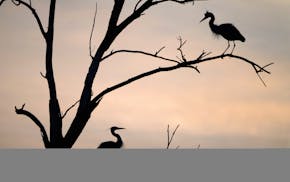Whatever else can be said about Ely bear researcher Lynn Rogers, he leads a complex life.
Idolized in many parts of the country, and the world, for his "walks with bears" that have been celebrated by BBC television, Rogers nonetheless fairly regularly finds himself at loggerheads with the Minnesota Department of Natural Resources.
So it has been, off and on, since 1993, when he retired from the Forest Service as a bear and white-tailed deer researcher.
During his career, he learned to habituate certain bears through food conditioning and walk alongside them in the woods.
Doing so, he said, allowed him to observe and study bears in ways few other researchers have.
Today, Rogers heads up the North American Bear Center just outside of Ely. A 9,600-square-foot museum-like education and information exhibit that opened to the public in 2007 at a cost of $1 million, the center was initially financed by Rogers and his wife, Donna.
Center members and other donors have since repaid the seed money.
So popular is the center, and particularly the Internet broadcasts it offers of live-cub births such as the two born a few days ago to "Lily," a 6-year-old mother bear who is denned up this winter near Ely, that an 8,000-square-foot addition is under construction.
The expansion is being paid for by a single donor who contributed $400,000, as well as $200,000 given by fans of Rogers and his work.
"The addition will allow us to cater better to schools," Rogers said, "including a broadcast center for schools around the world."
In 2010, more than 30,000 people visited the center, an increase of about 7,000 from the year before.
Even in the tough travel economies of the two years since, visitor numbers have held fairly steady, with an adult admission fee of $8.50.
Rogers also runs another nonprofit, the Wildlife Research Institute, which charges $2,500 a person in summer to "participate in close-up black bear research with Lynn Rogers, Phd," according to the institute's website.
Classes are limited to eight people and last three days (a fourth is reserved for packing and group pictures, according to the website).
Classes are already full for 2013, and the waiting list is closed.
All of which constitutes a track record Rogers and his many supporters consider exemplary.
But there's a problem. Or a couple of them.
One is that Rogers can't conduct his "research," including radio collar placement on bears, without a DNR permit.
And the DNR is running out of patience, waiting for Rogers and/or his assistant, Sue Mansfield, to publish peer-reviewed research based on his observations of, and interactions with, bears.
Additionally, the DNR is increasingly worried that bears Rogers has habituated have lost their fear of people and as a result possibly could constitute a nuisance -- if not a danger -- to people in and around Ely and Tower, Minn. (Rogers denies his bears are threats.)
For these reasons and others, Rogers' relationship with many in the DNR is, and has been for some time, problematic, evidenced most recently by a stern letter from Commissioner Tom Landwehr that, essentially, implores Rogers to publish peer-reviewed research or risk losing his permit.
Chances are, in fact, the permit already would have been pulled if Rogers didn't enjoy support and adulation among the public that few wildlife researchers have other than Jane Goodall (chimpanzees) and David Mech (wolves).
I've known Rogers since 1978. Some things I've written about him have been flattering. Others less so.
He is, by many descriptions, mine included, a bit of a nutty professor. But he's a forward thinker and has accomplished a lot, not least establishment of the Bear Center, which, ultimately, is good for bears and perhaps more so for Ely.
That said, Rogers needs to change course. If he doesn't, I have little doubt he will lose his DNR permit, sooner or later -- and probably sooner.
A good start would be to hire a bear researcher to do what the DNR wants, in fact what its research permit requires: publish peer-reviewed research.
Rogers and Mansfield doubtless have accumulated reams of valuable data over the years. But unless it's organized and published, it's of little use.
Rogers might, in the end, have to yield at least some control of the Wildlife Research Institute, the Bear Center or both. But he's 73, and that's going to happen in time anyway. Better he take action now to ensure survival of what he's founded, or most of it ...
Or risk losing it all.
Dennis Anderson danderson@startribune.com
Anderson: Anglers protesting tough new Mille Lacs rules are wrong

Anderson: Courts, not politicians, should rule on Red Lake, White Earth lands

Anderson: Multimillion windfall gets invasive carp deterrent moving
![A young whitetail deer searches for food as another blanket of snow coats the arrowhead. ] Minnesota -State of Wonders, Arrowhead in Winter BRIAN PETE](https://arc.stimg.co/startribunemedia/WK32UWWY6FKNWJUIYCJ6ZPT4AU.jpg?h=91&w=145&fit=crop&bg=999&crop=faces)
Anderson: In NE Minnesota, DNR staff, habitat and deer all decline

